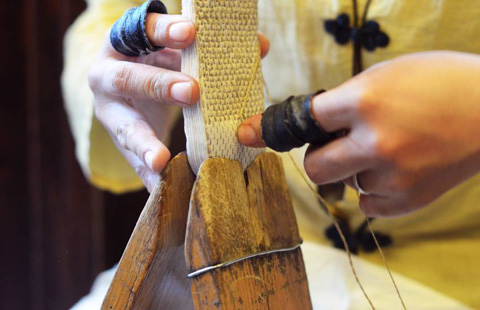Chinese online shop a choice for more Brazilians
(Xinhua) Updated: 2015-06-01 11:07SAN PAULO -- On Nov 11 last year, the first overseas order for Alibaba, China's biggest online e-commerce company, was from Brazil.
On that day of Alibaba's "11.11" online shopping carnival, the buying power of Brazilians ranked second after Russians worldwide. The Chinese e-commerce player has been quietly bringing about changes in Brazilians' online shopping habits.
Amanda Bernardo is known in Brazil rather as an online shopping master than a fashion reporter based in the state of Santa Catarina. She boasts one million clicks for shopping videos she posted online, the latest of which presented Chinese products bought from Alibaba's AliExpress.
"AliExpress is now my favorite overseas shopping website because it offers better prices and more options," Bernardo said. She hopes more Brazilians could benefit from her experience.
Bruno Calheiros, 26, is also an online shopping pioneer in Brazil. The exhibition designer can afford things in high-end malls with a monthly income amounting to $2,540, but he prefers doing shopping on the internet.
"I used to buy clothes, appliances and fitness equipment from Ebay and Amazon, but more so from AliExpress since I tried it. I just love it," said Calheiros, who has recommended AliExpress to many of his acquaintances.
The Alibaba platform was good for him in that the China-made goods there are abundant and very cost-effective, Calheiros added.
Even with an import duty of over 60 percent, the AliExpress pricing is lower than the local market, with clothing and luggage, for example, being cheaper by two thirds.
AliExpress is hitting more and more middle-class Brazilians like Bernardo and Calheiros as online shopping becomes increasingly popular in Brazil.
E-Bit data show that in 2014, the middle class accounted for 62 percent of online shoppers in the South American country, where online orders are expected to rise 19 percent to 123 million in 2015.
Another market research firm eMarketer predicts that the size of Brazilian e-commerce could reach 26.17 billion dollars in 2018.
Brazil has more than 100 million netizens, 51.5 million of them are online shoppers including some 10.2 million newcomers last year who helped lift Brazil's online shopping to 11.3 billion dollars, a year-on-year growth of more than 24 percent, according to E-Bit data.
Meanwhile, Chinese firms made up 55 percent of Brazil's overseas website shopping totaled more than 2.1 billion dollars. They made the achievement despite inconveniences in communication, delivery and payment.
- China treasury bond futures open mixed Monday
- China stocks open higher Monday
- China nuclear power firms merge to fuel global clout
- China's non-manufacturing PMI continues dipping in May
- China manufacturing activity continues to improve in May
- Helping aged also helps the economy
- Beware of capital account liberalization
- New-energy sales targets cut after poor performance

















